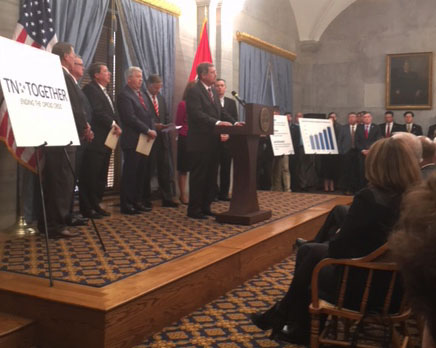On Monday, January 22, Tennessee Governor Bill Haslam announced the state’s new opioid plan – Tennessee Together, a three-pronged initiative to combating the epidemic. This aggressive plan focuses on three approaches: prevention, treatment, and law enforcement. House Speaker Beth Harwell and Lieutenant Governor Randy McNally were present representing the legislature while Chief Justice Jeff Bivins represented the judiciary.
“Chief Justice Jeff Bivins and the judiciary in Tennessee have taken a leading role, regionally and nationally, to achieve effective reforms. Through all of this work we’ve created the Tennessee Together initiative,” Governor Haslam said.
Several of the Tennessee Together initiatives involve legislation that will affect the courts of Tennessee. Governor Haslam announced 10 specific initiatives aimed at combating the opioid crisis.
During the announcement, Governor Haslam highlighted legislation that would allow opioid dependents within the criminal justice system to complete a nine to 12 month intensive residential substance abuse treatment program with the opportunity to receive a 60-day sentence reduction credit. The governor expressed his confidence that this will reduce recidivism, improve lives in communities, and save tax payer dollars.
Other initiatives of the Tennessee Together plan advocate for the establishment of three recovery compliance courts — one court for each grand division. Each court will include a criminal justice liaison to facilitate accountability in recovery support services for offenders.
The state opioid plan will also work to provide funding to the state’s Zero to Three court programs. Regarding incarcerated Tennesseans, the statewide opioid plan will attempt to re-purpose 512 beds — an increase of 50 percent — at a West Tennessee state prison in order to expand treatment and services.
Chief Justice Bivins spoke on the crisis and plan during the announcement. “I think we have a united front. I hope that us being here today together shows you that all three branches of government are committed to this plan. But, we also recognize that this is not something we’re going to solve overnight. This has to be a continued effort, and we have to be resolved in moving forward and fighting this. I am proud of our judiciary for what they have done already, taking roles not only within the state, but regionally and across this country.”
Chief Justice Bivins also thanked Judge Duane Slone and Judge Seth Norman for their presence at the announcement. Both judges are leaders in the fight against the opioid epidemic — Judge Slone is the chairperson of the Regional Judicial Opioid Initiative, compromised of eight states, and Judge Norman founded the Drug Court of Metropolitan Nashville & Davidson County. In addition, Deborah Taylor Tate, director of the Administrative Office of the Courts, is co-chair of the National Opioid Task Force created by the Conference of Chief Justices and Conference of State Court Administrators.
Governor Haslam ended with, “We look forward to a lot of healthy discussion in the weeks to come.”
Read the Governor’s announcement. Learn more about the plan.



